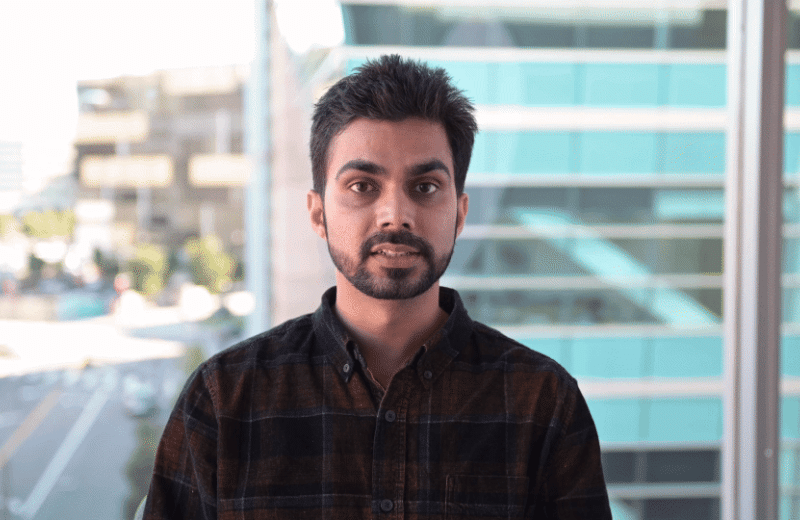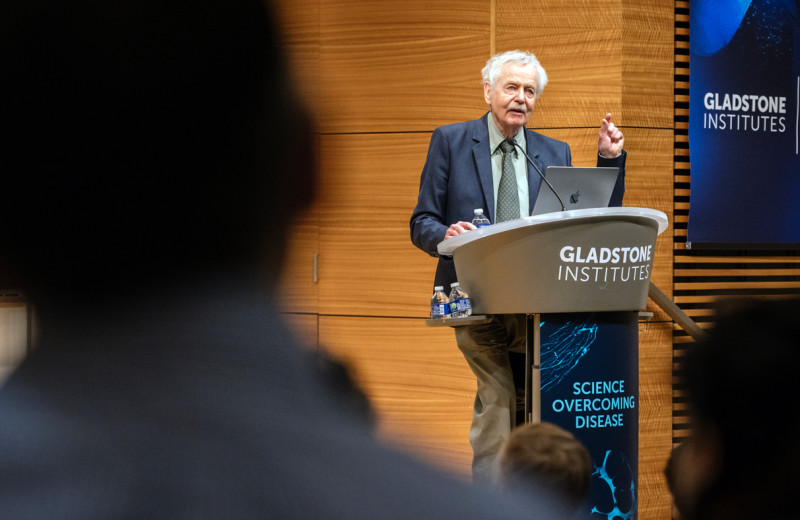Gladstone NOW: The Campaign Join Us on the Journey✕

Maike is a postdoctoral scholar in Leor Weinberger’s lab. She completed a Master’s degree at Warwick University in the United Kingdom, and obtained a PhD in physical organic chemistry from Radboud University Nijmegen in the Netherlands.
What brought you to Gladstone?
My graduate work involved creating water-in-oil emulsions, which were capable of gene expression from template DNA. It was interesting work because these controlled systems allowed me to probe very specific questions. However, I started realizing that I wanted to incorporate tools and questions from my graduate work in more complex systems. In other words, I wanted to start working with mammalian cells. I attended a conference where Leor was presenting work from his lab, and I immediately felt a strong overlap in interests, because his lab uses quantitative imaging and mathematical modeling to study viral gene expression and their circuits.
What do you like about Gladstone?
Gladstone is a great balance between academic informality and industrial efficiency, and provides great opportunities for development and learning. From a day-to-day perspective, my colleagues are wonderful to be around. And, importantly, the resources at Gladstone are simply amazing and I’m very thankful for our core facilities.
Were you interested in science as a child?
I wouldn’t say I was more interested in science than the average child. I think all children are curious, and given the right environment, that curiosity develops into something more. I was very lucky to have a stimulating chemistry and biology teacher in high school, and parents that knew how to encourage curiosity without pushing too hard.
Why did you decide to go to graduate school?
For me, it was the next logical step since I enjoyed science so much.
What or who influenced your decision to work in science?
I don’t think there is one thing or person that influenced my decision. The way my personality and way of thinking developed over time was the major driving force behind that decision.
What do you do when you are not working?
I love being outside. Hiking, backpacking, anything that brings me close to nature.
If you could learn to do anything, what would it be?
I would love to be able to play an instrument. I have no musical talents at all, but I’m fascinated by some people’s ability to master instruments.
What is your hidden/unique talent?
I wouldn’t call it a talent, but I have a passion for photography, mostly landscape and nature photography. I truly enjoy both the technical and the artistic aspects of photography.
Name one thing that not many people know about you.
Some people in my lab might know this, but I’m a competitive bathtub racer! Or, rather, I used to be during my grad school days.
If you could meet any scientist from any point in time, who would it be and why?
One scientist comes to mind immediately. Eratosthenes, a mathematician from the 3rd century BC, was the first scientist to accurately calculate the circumference of the earth, without ever leaving Egypt. He used the power of observation and simple geometry to calculate the earth’s circumference within 1 percent of the currently-accepted. I think that is pretty amazing!
To learn more about Maike's work, read about a recent discovery she made with her colleagues in the Weinberger Lab that revealed how the HIV virus commits to remaining in either an active or latent state.
Want to Join the Team?
Our people are our most important asset. We offer a wide array of career opportunities both in our administrative offices and in our labs.
Explore CareersMeet Gladstone: Shyam Jinagal
Meet Gladstone: Shyam Jinagal
Shyam Jinagal explores how genetics, aging, and regeneration shape the heart—and how those insights could one day restore heart function after injury.
Graduate Students and Postdocs Profile Cardiovascular Disease Srivastava LabA Sculptor of Modern Regenerative Medicine
A Sculptor of Modern Regenerative Medicine
Among his myriad accomplishments, Rudolf Jaenisch—winner of the 2025 Ogawa-Yamanaka Stem Cell Prize—was the first to demonstrate the potential of induced pluripotent stem cells to treat disease.
Awards Ogawa Stem Cell Prize Profile Regenerative Medicine Stem Cells/iPSCsMeet Gladstone: Shijie Wang
Meet Gladstone: Shijie Wang
Shijie Wang, a postdoctoral scholar in Steve Finkbeiner’s lab, uses artificial intelligence, robotics, and stem cell technologies to uncover how brain cells die in neurodegenerative diseases like Alzheimer’s and Parkinson’s.
Profile Neurological Disease Finkbeiner Lab AI Robotic Microscopy



